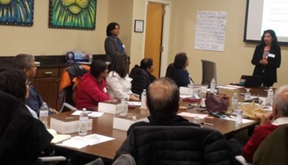
CHICAGO: South Asians are not always included in scientific research due to concerns about language barriers and a limited understanding of South Asians’ health priorities. The Center for Community Health (CCH) at Northwestern University’s Clinical and Translational Sciences Institute (NUCATS) is using Stakeholder-Academic Resource Panels (ShARPs) to change that.
Grisel M. Robles-Schrader, and Josefina Serrato, CCH staff hosted a ShARP meet that included 13 panel members on November 13 at Skokie Village Hall. Asma Ali, PhD, served as community co-facilitator with Robles-Schrader. The purpose of ShARPs is to continue engaging diverse communities who have not always been engaged in research.
Namratha Kandula, MD, MPH and Swapna Dave, MPH, MBBS, Research Project Manager at Northwestern University pitched for ShARP to gather input on the design of a study that aims to reduce heart disease among South Asians.
ShARPs help research teams meet with community stakeholders who have professional and/or personal expertise related to a research project or community of focus.
Community members offer feedback on ways to improve the relevance, practicality, and potential value of a research study.
The South Asian Healthy Lifestyle Initiative or SAHELI, is a 16-week program that will start recruiting South Asian men and women between the ages of 18-65, in the spring of 2018. Participants will meet in small groups on a weekly basis to discuss topics such as fostering family healthy eating habits, coping with stress, and staying motivated to continue practicing healthy habits.
Panel members identified for the ShARP include key stakeholders who could offer valuable insights on aspects of the research designed. Members include two community members, pharmacists, physical therapists, nutritionists, and staff from Indo American Center, North Shore University Health System and Apna Ghar. The group practiced using the Lose It! app, a free tool that can help to track participants’ daily food intake via smart phone, tablet, or desktop.
The group also discussed survey topics that could help the research team assess cultural stressors that could impact participant’s ability to practice healthy habits.One panelist noted “It’s refreshing and inspiring to be part of a nationally funded study focused on my community. Represent!”
Feedback shared by these stakeholders will be used to make revisions to the study protocol.
At the end of the ShARP, Drs. Kandula and Dave discussed opportunities for panel members to continue collaborating with the team on SAHELI, for example through participating in their Stakeholder Advisory Board or helping promote the study.
“Currently, there is very little research involving South Asians, which means that treatment and prevention discoveries may not be applicable to this community.
Surendra Ullal






